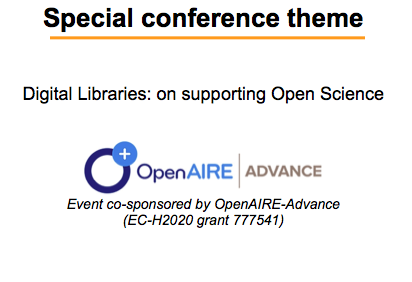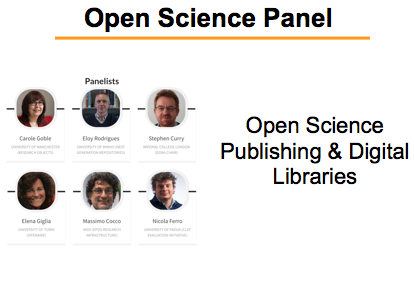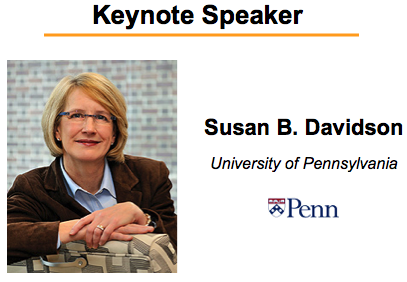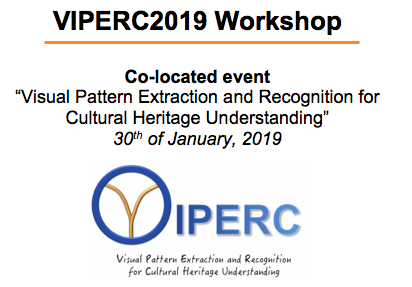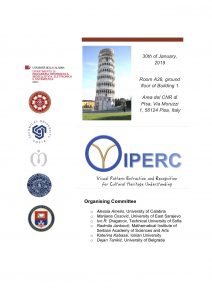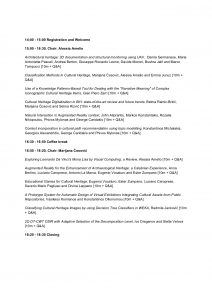Visual Pattern Extraction and Recognition for Cultural Heritage Understanding Workshop (VIPERC2019)

30th of January, 2019 (14:00 – 18:30)
Room A28, ground floor of Building 1
Area del CNR di Pisa, Via Moruzzi 1, 56124 Pisa
Event co-located with the IRCDL2019 conference
Workshop proceedings are online!
Workshop proceedings are online as CEUR-WS proceedings from here.
Background and goals
Nowadays, the cultural heritage represents an invaluable source of knowledge for a depth understanding of history and tradition. It can include archaeological sites and finds, historical monuments, manuscripts and documents, photographs, films, artistic works (paintings, decorative objects, sculptures, etc.), and other different elements of artistic, archaeological or historical value. In order to preserve historical treasures, different sensors have been used for producing large amount of visual data, which can be effectively processed for the extraction of useful information. In the last years, machine learning, intelligent systems and statistical analysis have become popular for the extraction, analysis and identification of patterns from visual data in different real-life scenarios.
In this context, the main goal of this workshop is presenting the advancement of the state-of-the-art in statistical and data mining tools, as well as the introduction of innovative and intelligent systems for visual pattern extraction, analysis and recognition aiming to preserve the cultural heritage. Hence, it combines multiple aspects deriving from different research areas such as Computer Vision, Pattern Recognition, Artificial Intelligence, Software Engineering, Archaeometry and History.
The workshop will take place in Room A28, ground floor of Building Area del CNR di Pisa, Via Moruzzi 1, 56124 Pisa, 14:00 – 18:30, 30th of January, 2019.
Program
Exploring Leonardo Da Vinci’s Mona Lisa by Visual Computing: a Review, Alessia Amelio
Classification Methods in Cultural Heritage, Marijana Ćosović, Alessia Amelio and Emina Junuz
Architectural heritage: 3D documentation and structural monitoring using UAV, Danila Germanese, Maria Antonietta Pascali, Andrea Berton, Giuseppe Riccardo Leone, Davide Moroni, Bushra Jalil and Marco Tampucci
2D DT-CWT CBIR with Adaptive Selection of the Decomposition Level, Ivo Draganov and Stella Vetova
Cultural Heritage Digitalization in BiH: state-of-the-art review and future trends, Belma Ramic-Brkić, Marijana Ćosović and Selma Rizvić
Classifying Cultural Heritage Images by using Decision Tree Classifiers in WEKA, Radmila Janković
Use of a Knowledge Patterns-Based Tool for Dealing with the “Narrative Meaning” of Complex Iconographic Cultural Heritage Items, Gian Piero Zarri
A Prototype System for Automatic Design of Virtual Exhibitions Integrating Cultural Assets from Public Repositories, Vasileios Komianos and Konstantinos Oikonomou
Natural Interaction in Augmented Reality context, John Aliprantis, Markos Konstantakis, Rozalia Nikopoulou, Phivos Mylonas and George Caridakis
Context incorporation in cultural path recommendation using topic modelling, Konstantinos Michalakis, Georgios Alexandridis, George Caridakis and Phivos Mylonas
Augmented Reality for the Enhancement of Archaeological Heritage: a Calabrian Experience, Anna Berlino, Luciano Caroprese, Antonio La Marca, Eugenio Vocaturo and Ester Zumpano
Educational Games for Cultural Heritage, Eugenio Vocaturo, Ester Zumpano, Luciano Caroprese, Saverio Mario Pagliuso and Divina Lappano
- Alessia Amelio, University of Calabria, Italy
- Marijana Ćosović, University of East Sarajevo, Bosnia and Herzegovina
- Ivo R. Draganov, Technical University of Sofia, Bulgaria
- Radmila Janković, Mathematical Institute of Serbian Academy of Sciences and Arts, Serbia
- Katerina Kabassi, Ionian University, Greece
- Dejan Tanikić, University of Belgrade, Serbia
- Efthimios Alepis, University of Piraeus, Greece
- Svetlin Antonov, Technical University of Sofia, Bulgaria
- Gazi Erkan Bostanci, Ankara University, Turkey
- Ivo Dochev, Technical University of Sofia, Bulgaria
- Žarko Ćojbašić, University of Niš, Serbia
- Vladimir Despotović, University of Belgrade, Serbia
- Lilyana Docheva, Technical University of Sofia, Bulgaria
- Branislav Gerazov, Ss Cyril and Methodius University in Skopje, Macedonia
- Dustin van der Haar, University of Johannesburg, South Africa
- Emina Junuz, Dzemal Bijedic University, Bosnia and Herzegovina
- Tomislav Kartalov, Ss Cyril and Methodius University in Skopje, MacedoniaVassilis Komianos, Ionian University, Greece
- Lyubomir Laskov, Technical University of Sofia, Bulgaria
- Miodrag Manić, University of Niš, Serbia
- Emmanouel Maravelakis, TEI of Crete, Greece
- Zoran Miljković, University of Belgrade, Serbia
- Zoran Milivojević, College of Applied Technical Sciences, Serbia
- Phivos Mylonas, Ionian University, Greece
- Nikolay Neshov, Technical University of Sofia, Bulgaria
- Slobodan Obradović, Information Technology School, Serbia.
- Konstantinos Oikonomou, Dean of the Ionian university, Greece
- Iyiola Emmanuel Olatunji, The Chinese University of Hong Kong, China
- Zulfiqar Ali Ranjha, National University of Computer & Emerging Science, Pakistan
- Rebeca Díaz Redondo, Universidade de Vigo, Spain
- Umar Shoaib, University of Gujrat, Pakistan
- Miroslav Trajanović, University of Niš, Serbia
- George Tsihrintzis, University of Piraeus, Greece
- Pierangelo Veltri, University of Calabria, Italy
- Ana Fernández Vilas, Universidade de Vigo, Spain
- Maria Virvou, University of Piraeus, Greece
- Eugenio Vocaturo, University of Calabria, Italy
- Spyros Vosinakis, Aegean University, Greece
- Ester Zumpano, University of Calabria, Italy
- Workshop: Jan 30, 2019 (afternoon)
- Submission deadline: Dec 20, 2018
- Notification of acceptance: Jan 4, 2019
- Camera-ready and registration: Jan 11, 2019
Contacts
Alessia Amelio
email: aamelio@dimes.unical.it
phone: +39 0984 494783
VIPERC 2019 is co-sponsored by OpenAIRE-Advance (EC-H2020 grant 777541)

